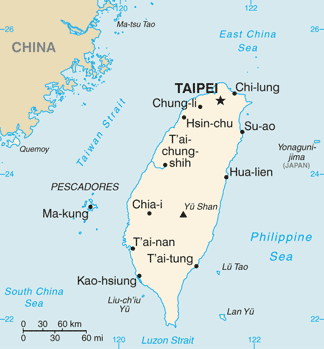By NewsDesk @bactiman63
The Taiwan Centers for Disease Control (CDC) has reported (computer translated) the first case of Japanese encephalitis of 2019 in a 60-year-old man from Kaohsiung City.

On May 1st, he developed fever, headache, convulsions and unconsciousness. He was admitted to hospital and subsequently admitted to hospital. The case persisted and the consciousness changed. On May 4, the hospital was notified by the hospital and transferred to hospital for treatment. On May 17, the test was confirmed. The current case is still consciously comatose in the intensive care unit.
An investigation into the case showed no recent history of foreign travel, and the history of related vaccination is unknown. During the incubation period, he had been at friends in Datun District and the natural recreation area of Fengshan District. Within 2 to 3 km of these sites, there are pig houses, meat markets and a number of paddy fields.
Taiwan is the epidemic season of Japanese encephalitis from May to October every year, and the peak of epidemics from June to July.
Japanese encephalitis is the most important cause of viral encephalitis in Asia. About 68,000 clinical cases are reported annually. It usually occurs in rural or agricultural areas, often associated with rice farming.
JE virus is transmitted to humans through the bite of infected Culex species mosquitoes, particularly Culex tritaeniorhynchus.
Most JE virus infections are mild (fever and headache) or without apparent symptoms, but approximately 1 in 250 infections results in severe disease characterized by rapid onset of high fever, headache, neck stiffness, disorientation, coma, seizures, spastic paralysis and death. The case-fatality rate can be as high as 30% among those with disease symptoms.
There is a protective vaccine against Japanese encephalitis virus.
- Dengue fever epidemic in Reunion: 10,000 cases since January
- Argentina reports two botulism cases linked to hummus
- Chicago: Measles case confirmed; Possible exposures at University of Illinois Chicago, Millennium Park
- Berkeley, CA: Measles case confirmed, Potential exposure place is the Berkeley Bowl
- Equine Herpes reported in Chester County, PA
- Thailand chikungunya update
- Belgium Legionnaires’ disease update
- Third Naegleria fowleri case reported in Karachi
- Hantavirus case reported in Grant County, Washington
- Measles: Additional case reported in Victoria, Australia
- Singapore dengue cases near 3500, eclipses 2018 numbers


One thought on “Taiwan reports 1st Japanese encephalitis case of year in Kaohsiung City man”